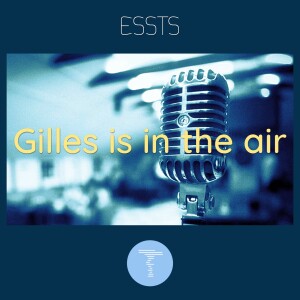Gilles is in the air
A podcast series hosted by the European Society for the Study of Tourette Syndrome (ESSTS).
Episodes

Saturday Jun 21, 2025
The Art of Treating Tics and Tourette
Saturday Jun 21, 2025
Saturday Jun 21, 2025
Our guest today (the episode was recorded in late April 2025) is Dr Noa Benaroya Milstein, Head of the Child Psychiatry Division Schneider's Children Medical Centre of Israel, where she also serves as Head of the Tourette Clinic. She is a Senior Lecturer at the Tel Aviv University Faculty of Medicine and actively involved in local and multi-centre studies specialised in Tourette syndrome and associated disorders.
We talk about first-line pharmacological treatments, co-occurring condition-treatment-prioritisation cases, assessing tic-related impairment, botulinum toxin injections, DBS, promising molecules, the effects of pregnancy and postpartum period on tics and the current landscape and available treatments in Israel.

Saturday Jun 21, 2025
Neuroleptic and other drug-induced tics
Saturday Jun 21, 2025
Saturday Jun 21, 2025
We are pleased to welcome today Tamara Pringsheim, who is a Professor with the Department of Clinical Neurosciences, Psychiatry, Paediatrics and Community Health Sciences at the University of Calgary. She also works as an evidence-based medicine methodologist for the American Academy of Neurology.
Tamara is the president of the Tourette OCD Alberta Network, a nonprofit organisation that supports people living with Tourette syndrome and Obsessive-Compulsive Disorder in Alberta, and provides education and training on these disorders to healthcare providers.
Suggested article:
"The Impact of Montelukast Duration on the Risk of Neuropsychiatric Disorders in Children with Asthma: A Population-Based Cohort Study" Visit page

Monday Mar 10, 2025
Median nerve stimulation in tic disorders
Monday Mar 10, 2025
Monday Mar 10, 2025
A long-awaited episode with Professor Stephen Jackson and Dr Barbara Morera from the University of Nottingham and Neurotherapeutics Ltd.
They have been developing "a safe and effective non-drug treatment that reduces tics and the urge to tic, through gentle stimulation of the median nerve in the wrist".
We are grateful to them for taking the time to answer very important questions that help us understand the effect of median nerve stimulation on tic suppression.
Please find below the questions addressed and the key points of our conversation.
Why is non-invasive stimulation of interest in the pathophysiological mechanism of tic generation?
How did the idea of using peripheral stimulation in modulating cortical motor excitability in tics occur?
When exploring the effect of median nerve stimulation on tic suppression in your study, what was your methodology (in terms of number of participants, inclusion criteria e.g. comorbidities, time and recurrence of stimulation, assessment of efficacy)?
What did it show? Did the MNS lead to a statistically significant reduction of tics?
Is MNS supposed to work only during stimulation?
You showed that rhythmic but not arrhythmic trains of MNS lead to entrainment of 12 Hz oscillations and are of interest in tic reduction, is that right? How would you interpret this result?
In your work, tic intensity and tic frequency were studied.
What scale did you use?
Did you distinguish vocal tics and motor tics?
Did the participants have particularly severe forms of TS?
How did you demonstrate that these results are not only the effects of distraction?
What is the effect of MNS of volitional movements and cognitive function?
Who would benefit the most from MNS? / For what use in real life would MNS be useful? Both for children and adults?
What do people feel when receiving this stimulation? Is it painful, irritating, annoying, strange?
Does MNS have a main effect or PU or tics? Are we able to know at this point
Is there a study planned with a larger sample or another objective?
Is there another use of MNS in movement disorders?
When do you think it will be available on the market? At what price?
Stephen Jackson is Professor of Cognitive Neuroscience at the University of Nottingham and Director of the University’s Centre for Neuromodulation, Neurotechnology, and Neurotherapeutics. He is a co-founder of Neurotherapeutics Ltd, a university medical device spin-out established in 2021 to develop a wearable for of non-invasive brain stimulation (the Neupulse device) for the treatment of tic disorders. His current research focuses on developing non-invasive brain stimulation treatments for a range of brain disorders and mental health conditions.
Dr Barbara Morera is a neuroscientist who has been working with Prof. Stephen Jackson on the development of a non-invasive treatment for Tourette Syndrome and Chronic Tic Disorder for the last 8 years. Co-founder of the company Neurotherapeutics, a spin out company from the University of Nottingham, founded with the aim to make this treatment available for those who would like to control their tics.

Thursday Dec 19, 2024
Gilles de la Tourette syndrome in pregnancy
Thursday Dec 19, 2024
Thursday Dec 19, 2024
Our guest for the 7th episode of "Gilles is in the air" is Dr Anna Castrioto from the Grenoble Alps University Hospital in France.
View her research works.
We talk about hormonal changes and tics, contraception methods in association with anti-tic treatments, tic changes during pregnancy and post-partum, treatments that are not recommended during pregnancy and the ones that are harmless.We address the same questions in relation to breast-feeding, enquire about concerns for DBS in women with TS during pregnancy and the difficulties they encounter in coping with TS in their role as mothers.

Monday Dec 16, 2024
Monday Dec 16, 2024
For our 6th episode, Christelle Nilles interviews Lindsay Berg, a special guest, who is very knowledgeable about today's particularly important topic.
Lindsay Berg is a Master’s student at the University of Calgary in the Clinical Psychology Program.
Her current research focuses on care equity and on examining barriers and facilitators of medical and mental health care for trans and gender diverse youth.
She previously worked in the Movement disorders clinic investigating functional tic-like behaviours.
(We apologise for the suboptimal audio quality at certain parts.)

